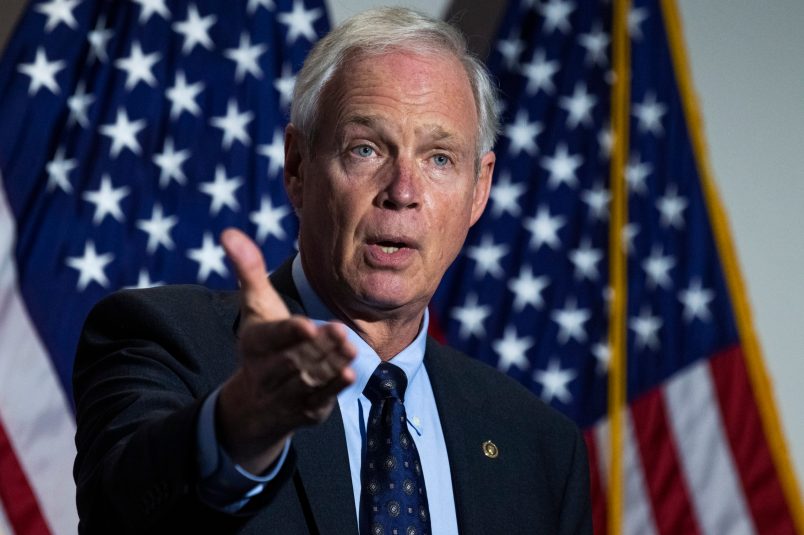For someone who’s talked a lot about the peaceful transfer of power between presidents, Sen. Ron Johnson (R-WI) has done less than nothing to assist in the peaceful transition between the Trump and Biden administrations.
Asked Tuesday whether he had congratulated President-elect Joe Biden on his victory, Johnson said “no.”
“There’s nothing to congratulate him about,” the Wisconsin senator said.
Reporter: "Senator, have you congratulated Vice President Biden yet?"
Sen. Ron Johnson: "No."
Reporter: "Why not?"
Johnson: "Nothing to congratulate him about." pic.twitter.com/Is7APE2frx
— The Hill (@thehill) November 10, 2020
Johnson has pushed Republicans’ bogus claims of widespread voter fraud for a while. In September, for example, he said Trump’s refusal to commit to a peaceful transfer of power reflected “legitimate concern” about mail-in voting. But the refusal to acknowledge Biden’s clear victory is particularly rich.
Why? The senator has worked on the laws governing presidential transitions for years and spoken loftily about the importance of transitioning peacefully between presidents.
During former President Barack Obama’s second term, for example, Johnson and Sen. Tom Carper (D-DE) co-sponsored the “Edward ‘Ted’ Kaufman and Michael Leavitt Presidential Transitions Improvements Act of 2015,” which Obama signed into law the following year. (In an ironic twist of fate, one of the law’s namesakes, former Sen. Ted Kaufman (D-DE) is now leading Biden’s transition effort.)
The law beefed up the executive branch’s obligations to ensure a smooth transfer of power and mandated organizational bodies at the White House and among the executive branch agencies focused on the presidential transition. In late 2016, a report from the Johnson-led Homeland Security and Government Affairs Committee counted the law as a success — saying that it “help[ed] ensure efficient transitions of power from one new administration to the next after a presidential election to keep Americans safe.”
“The peaceful transition of power from one administration to the next is one of the hallmarks of our democracy,” Johnson said when the bill passed the Senate in 2015. “It is also an enormous undertaking, with complexities that require months of planning in order to be successful.”
Then, during the Trump administration, Carper, Johnson and others worked together on another transition-oriented bill, the “2019 Presidential Transitions Enhancement Act.” When Donald Trump signed that into law in March of this year, Johnson thanked Carper and the President and said “Regardless of what party wins an election, we need to make sure that handing over the keys to the entire $4.45 trillion federal government is a smooth and secure process.”
Regardless of what party wins an election, we need to make sure that handing over the keys to the entire $4.45 trillion federal government is a smooth and secure process. Thanks @SenatorCarper for helping get this done.
— Senator Ron Johnson (@SenRonJohnson) March 4, 2020
In a statement to TPM, Carper said “a delayed transition has serious consequences, including potentially endangering our national security. That’s why it’s unfortunate that it seems some of my colleagues only respect the traditions and requirements of our government if their party wins.”
“But the bottom line is that it’s not up to Senator Johnson or Leader McConnell or President Trump to decide if or when a transition begins,” Carper added. “It’s a matter of law and precedent, including the law that Senator Johnson and I authored, and the law must be followed.”
Johnson has played politics with the transition process before: the latter transition law was written partly in response to Trump team complaints that federal officials working on the 2016 transition shared documents with special counsel Robert Mueller’s investigatory team.
But even in that effort — and despite Johnson’s later admission that his work “investigating the investigators” would hurt Joe Biden — the senator professed his belief that the peaceful transition of power itself was paramount.
“We are known in this country for the peaceful transition of power, respecting voters’ wishes,” he said in May — before accusing the Obama administration of not respecting that tradition.
This post has been updated.



